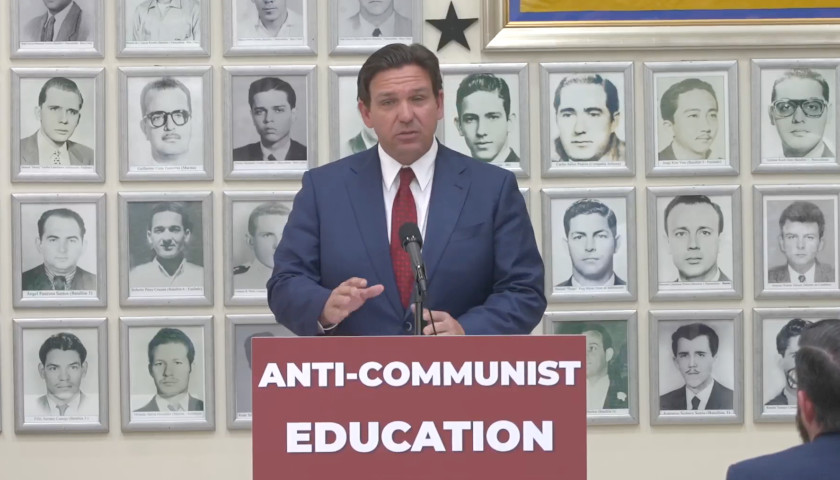Eight ballot initiatives are on the Arizona ballot this fall, with three still waiting for approval after submitting petition signatures. One of those three is the Protection from Predatory Debt Collection Act (PPDCA) which is being challenged by the Goldwater Institute over its description that will appear on the ballot, which the think tank alleges is “inaccurate and misleading.”
Filed on August 8, the lawsuit states, “The Arizona Protection from Predatory Debt Collection Act would institute sweeping changes to debt collection in Arizona that extend far beyond the measure’s purported purpose of limiting the interest rate on medical debt.”
Among other changes, the PPDCA limits the interest rate on debt collection to 3 percent, increases the money in bank accounts protected from creditors from $300 to $5,000, and prohibits lenders from garnishing the wages of anyone making less than $50,000 per year. More than half the workforce in Arizona makes less than $50,000 annually.
The Goldwater Institute lawsuit stated that additional provisions of the PPDCA include “raising the amount of home equity protected from unpaid businesses and creditors, and drastically increasing a host of other personal property exemptions.”
The think tank’s Executive Vice President Christina Sandefur said in a statement accompanying the lawsuit that the initiative will hurt low-income earners, not help them. “Making it harder for lenders to collect when borrowers fail to pay will increase the cost and decrease the availability of credit. And that will make it especially difficult for low-income earners to get loans and exacerbate the state’s housing affordability problem.”
The lawsuit asked, “Who will lend, if the state will simply deprive lenders of their right to repayment?” Michael Guymon, president and CEO of the Tucson Metro Chamber of Commerce, echoed this concern in his ballot argument opposing the PPDCA. He pointed out, “The timing of this initiative could not be worse considering it would increase prices on homes that are already unaffordable to many.”
The Greater Phoenix Chamber of Commerce also opposes the PPDCA. In a statement, the organization warned of “unintended consequences” and “a devastating impact on business in Arizona.” President and CEO Todd Sanders said it would make “it more difficult for people to buy homes and start businesses in Arizona.”
One of the primary allegations in the lawsuit is that while the description of the PPDCA says it “protects certain assets and exempts certain property from ‘certain legal processes to collect debt,’” it does not explain that this applies to all kinds of debt — more than just medical debt.
Another criticism asserts, “The description’s final sentence, which claims that the initiative ‘[d]oes not change existing law regarding secured debt,’ is more than misleading — it is patently false.” The lawsuit explains that while law wouldn’t change regarding voluntary secured debt, such as mortgages, it “does make profound changes” to laws regarding involuntary secured debt, such as judgment liens. It would make it very difficult for creditors to collect on the latter type of debt.
The lawsuit calls out ambiguous language. It is unclear “whether it would diminish the state’s ability to recover debts owed to the state, and thus could have a substantial effect on state revenue.” The Arizona Constitution requires initiatives to provide a source of funding for their costs, and the PPDCA does not indicate any funding source. The Arizona Constitution prohibits initiatives referred by the people to the ballot from dealing with funding for the government, and several other clauses reveal “the state’s public policy against legislation that would deprive the state of legal revenue or increase the state’s debts.”
The courts cannot give the initiative a lot of extra leeway due to the fact it would be very difficult for the state legislature to fix it later, the lawsuit notes. Arizona’s Voter Protection Act, which is part of the Arizona Constitution, only authorizes the legislature to amend voter initiatives to “further the purpose” intended, and those changes must be approved by three-quarters of the body, which is extremely difficult. Consequently, the Arizona Supreme Court said in Molera v. Reagan that the judiciary must strictly enforce the “regulation[s] of the initiative process.”
SEIU-United Healthcare Workers West, a union of healthcare workers headquartered in Oakland, California, is funding much of the initiative, drawing criticism from the Goldwater Institute, which labels the backers “a special interest group funded by California unions.”
PPDCA’s supporters turned in almost twice as many signatures as required, so even if there is a successful challenge to many of the signatures, there will likely not be enough of them disqualified to prevent it from making the ballot.
– – –
Rachel Alexander is a reporter at The Arizona Sun Times and The Star News Network. Follow Rachel on Twitter. Email tips to [email protected].








